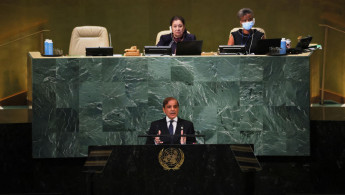Pakistan's prime minister talks Kashmir, floods at UN
Prime Minister Shahbaz Sharif appealed for a peaceful end to the dispute over Kashmir and deplored regional instability, invoking the perennial themes of Pakistan's U.N. addresses after dedicating the first half of his speech Friday to the ravages of recent floods.
The flood-induced devastation, which Sharif described in biblical terms, means it's incumbent on Pakistan to “ensure rapid economic growth and lift millions out of poverty and hunger," he said.
But in order to do so, Sharif said, Pakistan needs a “stable external environment” — that means peace in South Asia, which he said hinges on a resolution of the decades-long dispute over Jammu and Kashmir.
“At the heart of this longstanding dispute lies the denial of the inalienable right of the Kashmiri people to self-determination,” Sharif said, outlining what he called India's “relentless campaign of repression” and “serial brutalisation” of Kashmiris.
Kashmir is divided between India and Pakistan and has been claimed by both since they won independence from the British empire 75 years ago.
Sharif accused India of its own colonial ambitions by trying to change Kashmir's demographics from majority Muslim to majority Hindu. While he described Islamophobia as “a global phenomenon,” he specifically accused India's Hindu nationalist government of engaging in “the worst manifestation of Islamophobia.”
India — which has said Kashmir is an internal matter and one of law and order — is scheduled to speak at the General Assembly on Saturday. Rights groups have accused Indian Prime Minister Narendra Modi’s governing party of looking the other way and sometimes enabling hate speech against Muslims. Modi’s party denies the accusations, but India’s Muslims say attacks against them and their faith have increased sharply.
Sharif also spoke at length about regional instability and terrorism — of which he called Pakistan “the principal victim.”
He presented a marked contrast from his flashy yet conservative predecessor, Imran Khan, who dedicated much of last year's speech to accusing the United States of victimising Pakistan. Khan was ousted in April after losing a no-confidence vote.
Dressed in a sober business suit instead of Khan's favoured waistcoat-and-salwar-kameez combination, Sharif didn't once mention the United States by name.
He was impassioned, at times vigorously tapping the rostrum or demonstratively bringing his fists together, but his words struck a less combative tone.
“Pakistan is a partner for peace," Sharif said before departing from prepared remarks: “But Mr. President, peace can only be ensured and guaranteed when the rights of communities who have been suffering over decades, and subjugated over decades, earn their freedom and are respected.”
Sharif's speech also represented a departure from last year, when Khan expressed optimism about the then-incipient Taliban rule in Afghanistan and exhorted the General Assembly not to isolate the new government. A year later, no U.N. member state has recognised the Taliban government.
“Pakistan would also like to see an Afghanistan which is at peace with itself and the world, and which respects and nurtures all its citizens, without regard to gender, ethnicity and religion,” he said, avoiding direct mention of its current government.
Above all, he echoed a fear common to countries who typically do not dominate the global discourse: “My real worry is about the next stage of this challenge, when the cameras would have gone or left this august assembly and the story just shifts away to conflicts like Ukraine,” he said of the flooding recovery. “My question is, will we be left alone, high and dry?”





 Follow the Middle East's top stories in English at The New Arab on Google News
Follow the Middle East's top stories in English at The New Arab on Google News


